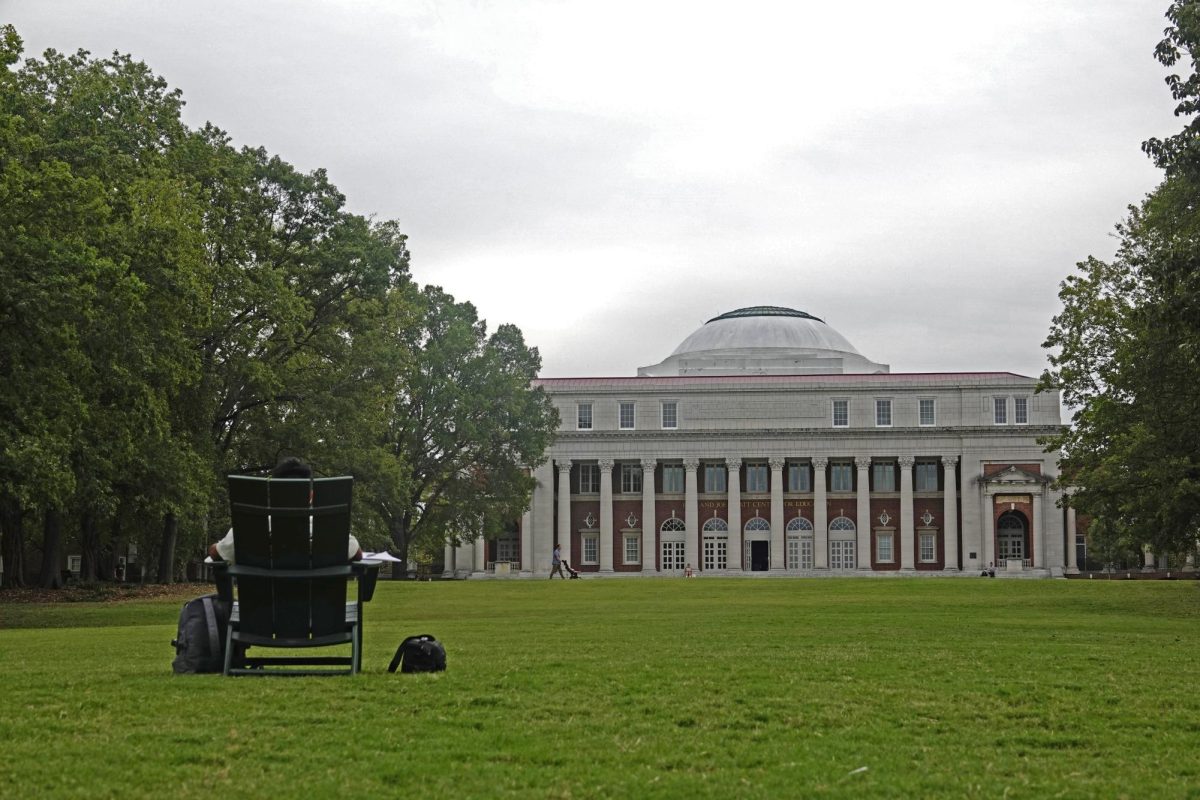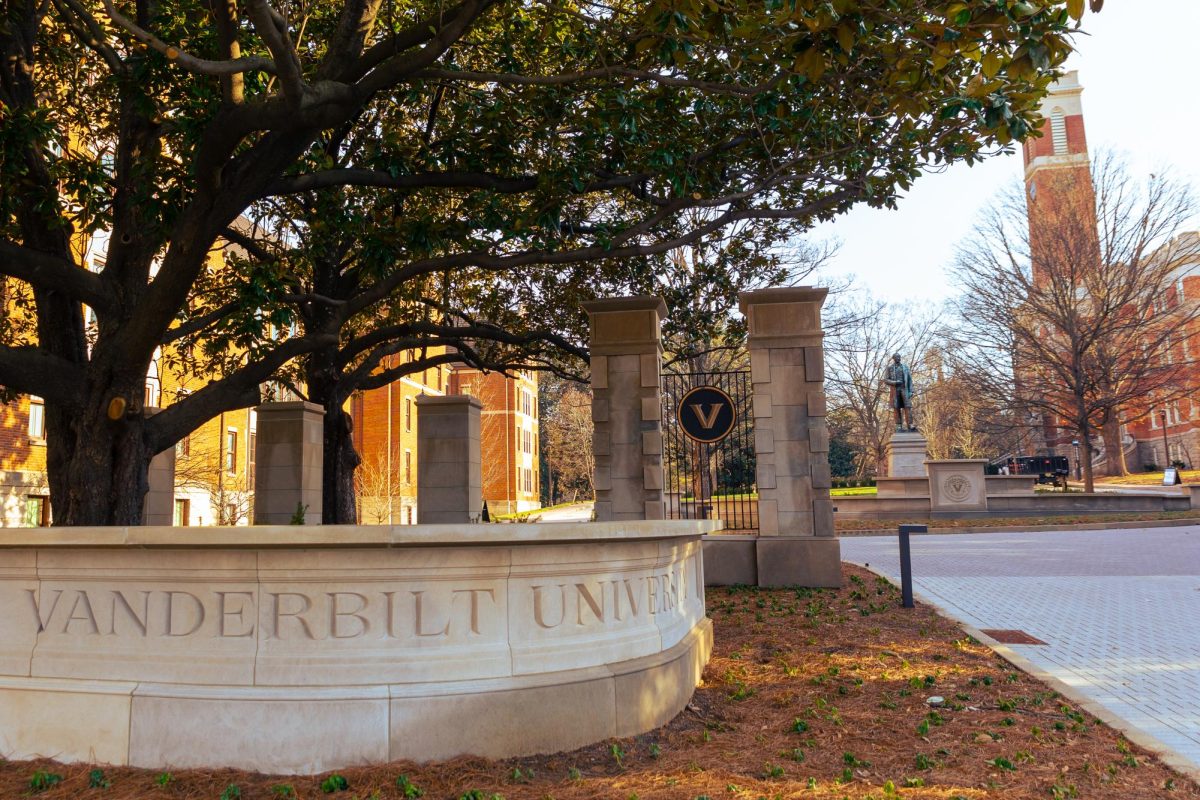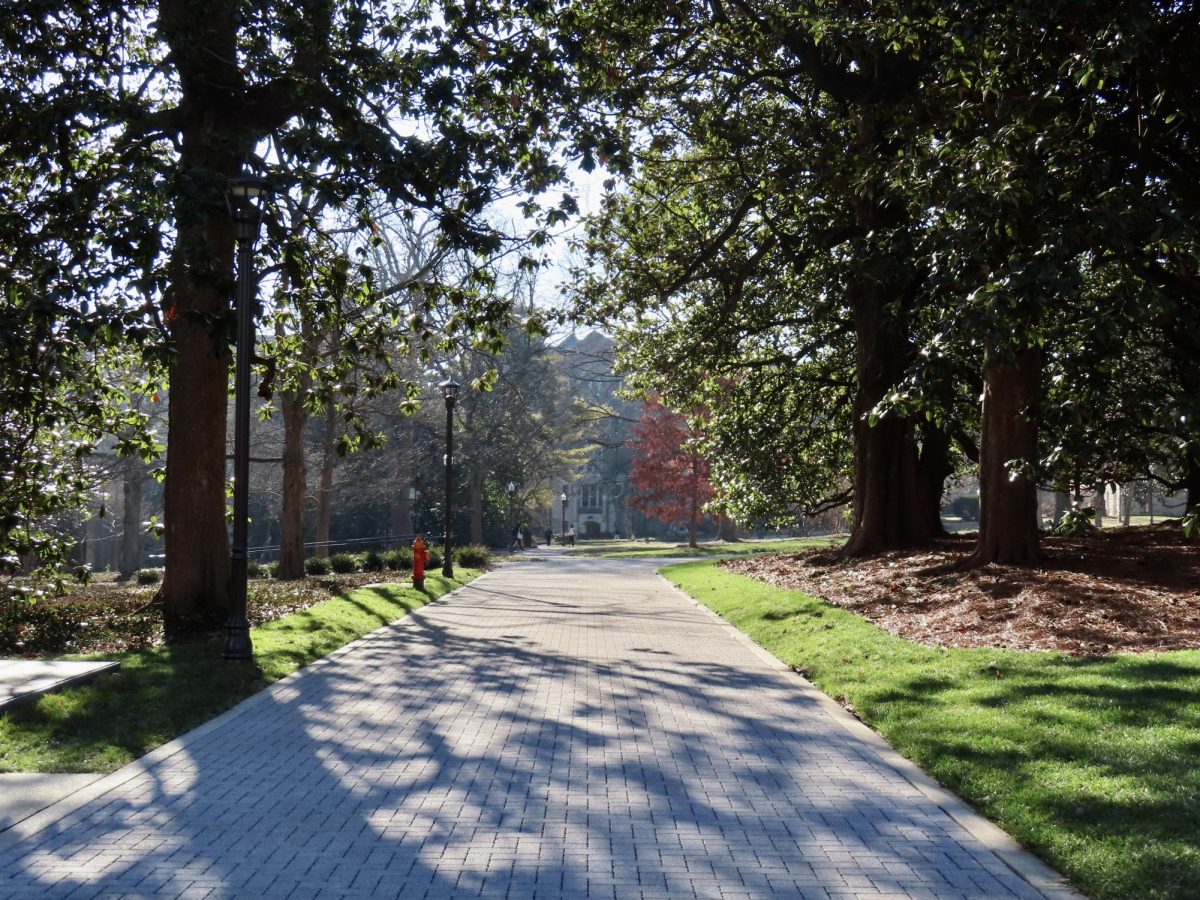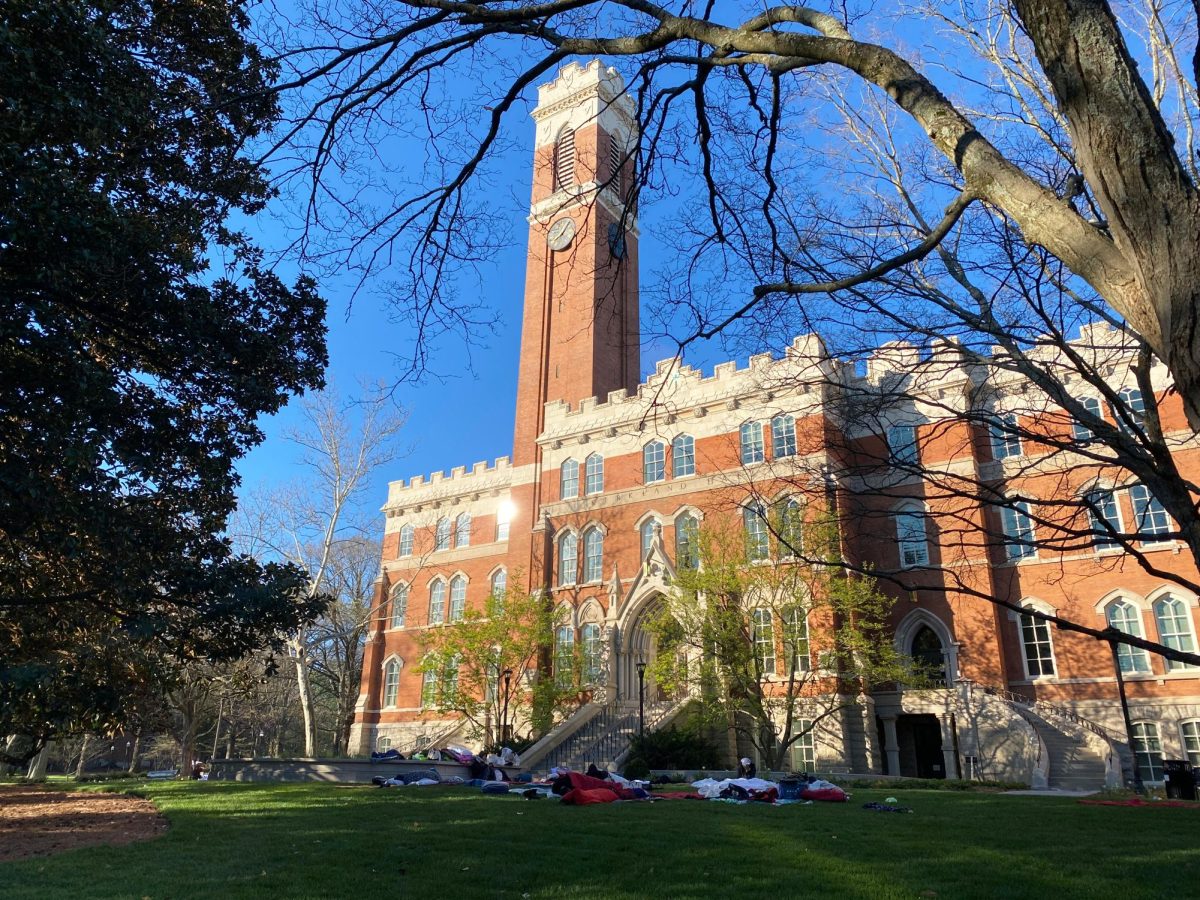CORRECTION: This piece was corrected on Oct. 14, 2023, at 2:40 p.m. CDT. It previously stated that Shreya Gupta chaired VSG’s Sexual Assault Awareness and Prevention Committee, but she chaired the Diversity, Equity and Inclusion Committee. This article was further corrected on Oct. 15 at 3:05 p.m. CDT. It previously stated that Chandler Quaile graduated in 2023, but he is currently a senior.
Two running mates in last semester’s Vanderbilt Student Government election used their campaign to play a game of “what if” with the student body. What if we rename Rand “Ayn Rand Hall”? What if we build a highway through Alumni Lawn? What if we…dissolve VSG?
The “what if” game was successful, leading to seniors Sam Sliman and Kendelle Grubbs being elected VSG president and vice president. They both write for the Slant, Vanderbilt’s satirical publication. The two students are currently in the process of dissolving our student government. So, how did Sliman and Grubbs manage to get elected? And what can this election and the subsequent fallout of their administration tell us about the future of our country?
An accidental VSG president
“One of my main goals with the campaign was to have everybody kind of wondering [whether we were serious candidates] the whole time,” Sliman said in an April 10 interview with The Hustler. “I think we were able to strike a balance where people were never really sure exactly what was going on.”
In the runoff election, Sliman and Grubbs faced veteran VSG members Ari Sasson and Shreya Gupta, both seniors. Sasson served as VSG vice president under then-President Amisha Mittal (‘23) for the 2022-23 school year, while Gupta chaired the Diversity, Equity and Inclusion Committee.
On March 30, mid-campaign and a few days after the tragic shooting at The Covenant School, Sliman challenged Sasson to a boxing match, selling tickets to raise money for the victims and families impacted by the shooting. During a week rife with sadness, anger and frustration, for a few moments, it gave us something less threatening to worry about. At the same time, the fight helped our campus find humor in our differences and unite where former generations have divided.
On Alumni Lawn, humor revealed that Sliman and Sasson are more similar than they are different – by the end of the boxing match, the two were smiling and bonding. We distinguished ourselves from former generations as the generation that doesn’t always fall prey to interpersonal conflict. Sliman and Grubbs’s campaign and victory reflect a shift in what our student body is demanding from its leadership.
“Everything was playing out how we expected until the very end,” Sliman said.
In the runoff election, Sasson led Sliman 49% to 32%, respectively. After the final tally, Sliman and Grubbs won the election with 51% of the vote.
So, what changed?
The change
During the 2021-22 school year, former VSG President Hannah Bruns (‘21) vocally supported student advocacy for Vanderbilt’s administration to divest from fossil fuels and worked with a group of students to hang a poster outside Rand in March 2022 to protest a speaker at a Chabad event. The following year, Mittal and Sasson were less known for their campus activism compared to their outspoken counterparts – 2021-22 VSG Vice President Kayla Powell (‘23) and senior Chandler Quaile. Mittal and Sasson’s win may have reflected how counter-administration social advocacy has taken a back seat among students’ priorities, especially given that the pair boasted similar platforms.
The tension around VSG on our campus parallels the political tension and changes taking place in our nation. Specifically, older generations have created political distrust and stalemate around issues like LGBTQ+ rights and gun reform. On campus, students have expressed outrage about the conservative legislators in the Senate who stall “common sense” gun control reform. Similarly, students create conflict over the relatively small group of students in Vanderbilt College Republicans organizing a debate on transgender rights.
In reality, though, consensus around LGBTQ+ rights and progressive social policy are growing among our generation, and a majority of constituents in Tennessee support “common sense” gun control reform, despite their representatives who often only represent the big gun lobby. Many of the controversial debates we see in the media today are last-ditch attempts by elderly legislators to resist the reigning wave of progressivism.
Americans are also becoming frustrated with the number of voices weighing down the bureaucracy. Policies are getting longer and longer because they are informed by medical experts, economists, activists and more. Notably, Friedman points out that the Affordable Care Act had 22,000 pages of regulations compared to the 79-page Social Security Act of 1965. He predicts that building tensions and complication of bureaucracy will eventually transition into a system with more leaders who can communicate with these various experts and streamline their knowledge solutions more efficiently.
Likewise, VSG is an ineffective bureaucracy siloed into a Senate and committees. The organization’s “laws” have no binding power. VSG senators and committee members attempt to learn about countless parts of campus and master various skills in order to work with campus dining, rename buildings or pass legislation to rename buildings – all to draft legislation about these issues that might not be implemented. Its $200,000 annual allotted budget has been spent frivolously. As a result, students have called on other outsider candidates from the 2023 election to address structural and budget concerns for VSG.
“VSG is not a government,” Sliman said. “It doesn’t have any legislative power. It can’t pass laws.”
Grubbs said she and Sliman hesitated to drop out after the primary election because they feared that that election rules might not cede the victory to the runner-up but necessitate that a second election be held. They said this possibility could have led to candidates investing more energy into campaigning and new candidates joining the race.
“We didn’t want to let people down,” Sliman said about why he and Grubbs accepted the roles.
“My goal was definitely not to end up as VP,” Grubbs added.
Their victory was largely a product of political circumstances – being in the right place at the right time. So, the million-dollar question remains: will the two anti-establishment outsiders be able to “dissolve VSG”?
Before taking office, Sliman and Grubbs explained their elaborate plans for VSG. According to Sliman, VSG is only capable of allocating its budget and communicating between students and administrators. He and Grubbs plan to abolish VSG’s Constitution and replace it with a structure that is more true to the organizations’ inherent purpose. Whenever an initiative is passed, a group of “body” members will assemble to execute it, reducing extraneous roles that complicate bureaucracy. Sliman and Grubbs have released a draft of a new constitution, which will eventually be voted on by VSG’s Senate.
Still, questions remain as to the feasibility of this plan, and Sliman and Grubbs being “outsiders” in VSG trying to resolve students’ frustrations is a double-edged sword. On one hand, their vision is not confined to preconceptions about how the organization “has” to operate. On the other hand, they might just be overly optimistic, ignorant of the administrative barriers that exist to their plan.
“It hasn’t yet been put up for a vote, because it is still in the process of revisions,” junior Hananeel Morinville, current chair of VSG’s Economic Inclusivity Committee. “There are many details and disagreements that they are realizing might not work in practice.”
Today, over two months into their administration, no date has been set for a vote on the new Constitution. We don’t yet have any tangible proof that the two will, in fact, “dissolve” VSG. In the meantime, VSG has been operating according to its traditional structure.
Political frustration and the 2024 presidential election
The fallout of student frustrations in this election could be a microcosm that can help us understand what’s to come in the 2024 U.S. presidential election. Even if voters want it, are “outsiders” the best ones to rectify the institutional flaws facing college students and Americans?
Approaching the 2024 U.S. presidential election, rising economic frustration and disapproval of the U.S. government are causing Americans to become cynical of traditional political leadership. Vanderbilt students are dealing with the same frustrations with the rising cost of living in America, expenses of being a college student and unsatisfactory government on the both university and national levels. As a result, voters are becoming cynical of status quo political leaders and – questioning their capacity to achieve the economic and regulatory efficiency that Americans need. This rhetoric is perhaps the mindset that resulted in Powell and Sasson’s respective defeats and the eventual election of “satire” candidates to lead VSG.
Despite threats by Republican presidential candidates to defund highly-valued programs like social security and medicare, the Democratic strategy for 2024 is also built on fragile ground if the party can’t brand its establishment candidate and high-spending platforms as coinciding with systemic efficiency. In turn, Republicans who disparage establishment candidates and prioritize balancing the budget could have an advantage among skeptical Americans in 2024.
Only time will tell if Sliman and Grubbs can be our campus’s unconventional saviors by “dissolving” VSG as they promised. But the victory of our school’s first “satire” VSG president and vice president is certainly monumental and may reveal the broader nature of skeptical American voters that could play a vital role next year on the national stage.











